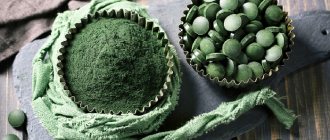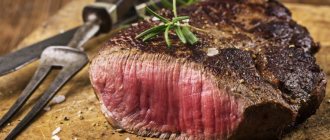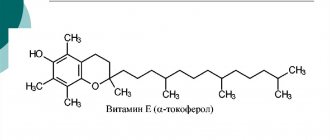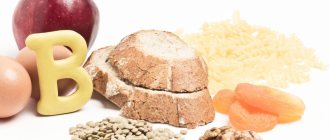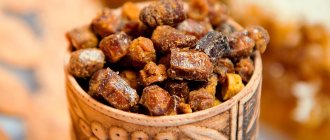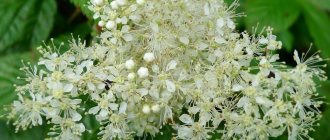Thiamine is one of the water-soluble B vitamins, also known as vitamin B1 . Some foods, including artificially fortified ones, or food additives can be a source of thiamine. This vitamin plays a crucial role in energy metabolism and therefore in the growth, development and functioning of cells.
In our body, thiamine is stored primarily in the liver, but in very small quantities and has a short half-life, so people need a constant supply of it through food.
About 80% of all thiamine in the adult body is in the form of thiamine diphosphate, the main metabolically active form of thiamine. The active form of thiamine serves as an important cofactor for five enzymes involved in the metabolism of glucose, amino acids and lipids.
Blood levels of thiamine are not reliable indicators of thiamine levels in a person's body. To determine thiamine status, the method of assessing its content in urine is widely used. However, these indicators only indicate dietary intake of thiamine, and not its tissue reserves. In adults, urinary thiamine excretion of less than 100 mcg/day suggests insufficient thiamine intake, and less than 40 mcg/day indicates extremely low intake.
Pharmacodynamics and pharmacokinetics
Thiamine is a synthetic analogue of vitamin B1 with good water solubility. Inside the body, during the process of phosphorylation, the substance is converted into cocarboxylase , a coenzyme of most enzymatic reactions.
According to the pharmacopoeia, Thiamine Chloride, Thiamine Bromide, Thiamine Vial, Thiamine Hydrochloride are all trade names and analogues of vitamin B1. These medications are available as white crystalline powder, capsules, tablets, or solution.
They usually have a weak specific odor, are highly soluble in water, are resistant to acidic solutions, but are easily destroyed when exposed to alkaline and neutral environments.
Parenteral administration of drugs allows it to quickly penetrate the blood and be distributed fairly evenly throughout the body.
Phosphorylation of the substance occurs in the liver area. Accumulation of the vitamin is noted in the heart, liver, kidneys, brain and spleen. The main substance is excreted by the liver and kidneys.
Vitamin B1 or Thiamine is necessary for complete carbohydrate, protein and fat metabolism, normal functioning of the nervous, digestive, endocrine and cardiovascular systems.
Thiamine Mononitrate - what is it?
Thiamine Mononitrate has low hygroscopicity, but is highly resistant to external factors. Therefore, it is actively used in the process of fortification of various food products.
Functions of thiamine in the human body
Thiamine is involved in several important processes:
- Thiamine (vitamin B1) ensures the conversion of carbohydrates (sugar) into energy, which then enters cells and is consumed during their life.
- Vitamin B1 is involved in the synthesis of the happiness hormone serotonin and gamma-aminobutyric acid (GABA), which, among other things, has a calming, blood pressure-stabilizing and analgesic effect.
- Thiamine is involved in the production of the neurotransmitter acetylcholine, which plays a critical role in processes such as muscle movement, memory and learning.
Indications for use
Thiamine is prescribed for:
- hypovitaminosis and vitamin B1 deficiency;
- neuritis, radiculitis, neuralgia, peripheral paresis and paralysis, myocardial dystrophy, intestinal atony;
- fasting;
- chronic alcoholism;
- severe liver dysfunction;
- thyrotoxicosis;
- increased need for vitamins during pregnancy.
Recommended consumption
The table lists the current RDA values for thiamine. DRI is the average daily intake level sufficient to meet the nutrient requirements of almost all (97–98%) healthy people.
*Adequate intake levels (AI) for thiamine have been established for infants from birth to 12 months, which are equivalent to the average thiamine intake of breastfed infants.
Thiamine, instructions for use (Method and dosage)
Instructions for use of Thiamine chloride indicate that this drug can be prescribed for both internal and parenteral administration. The dosage is determined by the doctor, but on average for adult patients it is 10 mg taken up to 5 times a day. For small patients under 3 years of age, the recommended dose is 5 mg taken every other day, for children 3-8 years old - 5 mg 3 times a day every other day, from 8 years old - 10 mg 1-3 times a day. The duration of treatment is about 30 days.
The instructions for Thiamine hydrochloride recommend its use for deep intramuscular injection. For adult patients and children over 7 years of age, a daily dosage of 25-50 mg is prescribed. Treatment begins with the introduction of a small amount of solution. If the drug is well tolerated by patients, the daily dosage is increased by 25 mg. In this case, the daily dose should not exceed 300 mg. The therapeutic course is 10-30 injections. Children under 3 months are prescribed 12.5 mg, from 4 months to 7 years – 25 mg taken once a day.
Interaction
Simultaneous use with solutions containing sulfites , as well as Cyanocobalamin , reduces their activity.
With simultaneous parenteral administration of Thiamine and Pyridoxine or Cyanocobalamin a significant increase in its effect is possible. In addition, vitamin B6 may complicate the conversion of Thiamine. It is prohibited to mix vitamin B1 with Penicillin or Streptomycin , which can cause the destruction of antibiotics , as well as with nicotinic acid , which can destroy vitamin B1.
Combination with suxamethonium iodide, Redergama, Phentolamine, Anaprilin, some sympatholytics , for example: Reserpine or Octadine , reduces their pharmacological effect. The combination of Thiamine and hypnotics can reduce their hypnotic and hypotensive activity.
Special instructions
What foods contain vitamin B1?
To prevent Vitamin B1 deficiency, you need to include foods that contain this substance in your diet. Most of this component is found in buckwheat, oatmeal, peas, nuts and fatty pork. Thiamine is also found in bread made from wholemeal flour, sprouted wheat, rice bran, green vegetables, some berries and fruits.
A sufficient amount of the vitamin is present in wild and garden greens, algae, brewer's yeast, poultry, beef, liver, eggs and fish.
Use of Thiamine chloride and its analogues for hair
Thiamine Vial in ampoules is intended for strengthening hair, which is not recommended for use in its pure form, due to the possibility of developing allergic reactions .
Thiamine Vial - what is it?
It should be noted that this drug is an analogue of vitamin B1. You can significantly improve the condition of your hair if you use this product with shampoo. Before each wash of your hair, you need to add just a few drops of vitamin to your shampoo. The result of this will be beautiful and manageable hair.
In addition, you can add thiamine to hair masks or balms, which significantly enhances their positive effect on quality and structure. An excellent way to strengthen hair is wrapping, which makes it healthier, more beautiful and shiny.
To do this, make a mixture of two teaspoons of castor or burdock oil, an ampoule of thiamine, an ampoule of vitamin A , Dimexide and lemon juice.
All this needs to be mixed well and rubbed into the hair roots. The rest of the product is distributed along the length of the hair. Wrap your head in a towel and leave for at least two hours. Then wash your hair well with shampoo. It is recommended to perform the procedure every other day for three weeks.
Thiamine in food
Food sources of thiamine include whole grains, meat and fish. Pork is another important source of the vitamin. Dairy products and most fruits are low in thiamine.
Heating foods containing thiamine can reduce their thiamine content. For example, bread contains 20–30% less thiamine than the raw ingredients, and pasteurization reduces the thiamine content of milk, which is already low, by up to 20%.
Data on the bioavailability of thiamine from food are very limited. Some studies show that thiamine absorption decreases with increasing dosage. This is associated with the absence of toxicity and any side effects of thiamine.
Analogs
Level 4 ATC code matches:
Kokarnit
Enerion
Cocarboxylase
The main analogues of this drug: Vitamin B, Vitamin B1, Aneuril, Aneurin, Benerva, Berin, Betabion, Benevrin, Betamin, Betanevrin, Betaxin, Betiamin, Bevital, Bevitin, Christovibex, Orizanin, Vitaplex Bi.
Also have a similar effect: Neurovitan, Folic acid, Nicotinic acid, Bepanten.
Reviews of Thiamine
There are many discussions online related to the use and effectiveness of vitamin B1. At the same time, reviews of Thiamine only confirm its great importance for the human body.
It should be noted that this substance is used everywhere. For example, injections with this drug are given as part of complex therapy for the threat of miscarriage in pregnant women. In most cases, this treatment is very successful.
However, this drug is especially popular as a highly effective hair strengthening product. On various forums, women actively share their ways to improve the condition and restore the health of their hair. Users who are not yet familiar with these methods constantly clarify: Thiamine is what kind of vitamin and what can you replace it with? Women are also interested in: Thiamine chloride - what is it and what is its difference from, for example, Vial or hydrochloride?
As you know, vitamin B1 is an essential participant in the processes of full growth and development of the body, providing support for the normal functioning of the cardiovascular, nervous, and endocrine digestive systems.
Therefore, you need to take care of a sufficient intake of this vitamin in the body through a nutritious diet. If this is not enough, then you should organize an additional intake of a vitamin preparation or vitamin complex.
People at risk of thiamine deficiency
Certain groups of people are most likely to have inadequate thiamine status. Here are five diseases or conditions in which thiamine plays an important role.
- People with alcohol addiction . Up to 80% of people with chronic alcoholism develop thiamine deficiency because ethanol reduces gastrointestinal thiamine absorption, liver thiamine stores, and thiamine phosphorylation. In addition, people with alcoholism typically do not get enough essential nutrients, including thiamine.
- Aged people. About 20–30% of older adults have laboratory values indicating some degree of thiamine deficiency. Possible causes include low dietary intake, chronic illness, concomitant use of multiple medications, and low thiamine absorption as a result of natural aging.
- People with HIV/AIDS. People with HIV infection have an increased risk of thiamine deficiency and its consequences, including beriberi and Wernicke-Korsakoff syndrome.
- People with diabetes. Some small studies have found that plasma thiamine levels in people with type 1 diabetes are 76% lower than in healthy volunteers, and 50–75% lower in people with type 2 diabetes.
- People who have had bariatric surgery. Bariatric weight loss surgery comes with some risks, including severe thiamine deficiency due to decreased nutrient absorption, which can lead to severe vitamin deficiencies. Micronutrient supplements that include thiamine are almost always recommended for bariatric surgery patients to avoid deficiencies.
Thiamine price, where to buy
The price of Thiamine in its pure form varies between 28-40 rubles. You can buy ampoules at a price of 28 rubles, tablets from 32 rubles.
- Online pharmacies in RussiaRussia
- Online pharmacies in UkraineUkraine
- Online pharmacies in KazakhstanKazakhstan
LuxPharma* special offer
- Benerva (thiamine chloride tablets!) 300 mg tab.
No. 20 1970 rub. order
Pharmacy Dialogue
- Vitamin B1 (thiamine chloride) (amp. 5% 1ml No. 10) Yerevan Chemical Pharmaceutical Plant
34 RUR order
- Vitamin B1 (thiamine chloride) (amp. 5% 1ml No. 10) BZMP
41 rub. order
show more
Pharmacy24
- Thiamine chloride-Darnitsa 5% 1 ml No. 10 solution PrAT" Pharmaceutical company "Darnitsa", Ukraine
29 UAH. order
PaniPharmacy
- Thiamine chloride solution d/in. 5% amp. 1ml No. 10 Ukraine, Darnitsa ChAO
29 UAH order
- Thiamine chloride solution d/in. 5% amp. 1ml No. 10 Ukraine, Lekhim-Kharkov CJSC
25 UAH order
- Thiamine chloride solution d/in. 5% amp. 1ml No. 10 Ukraine, Health LLC
23 UAH order
show more
